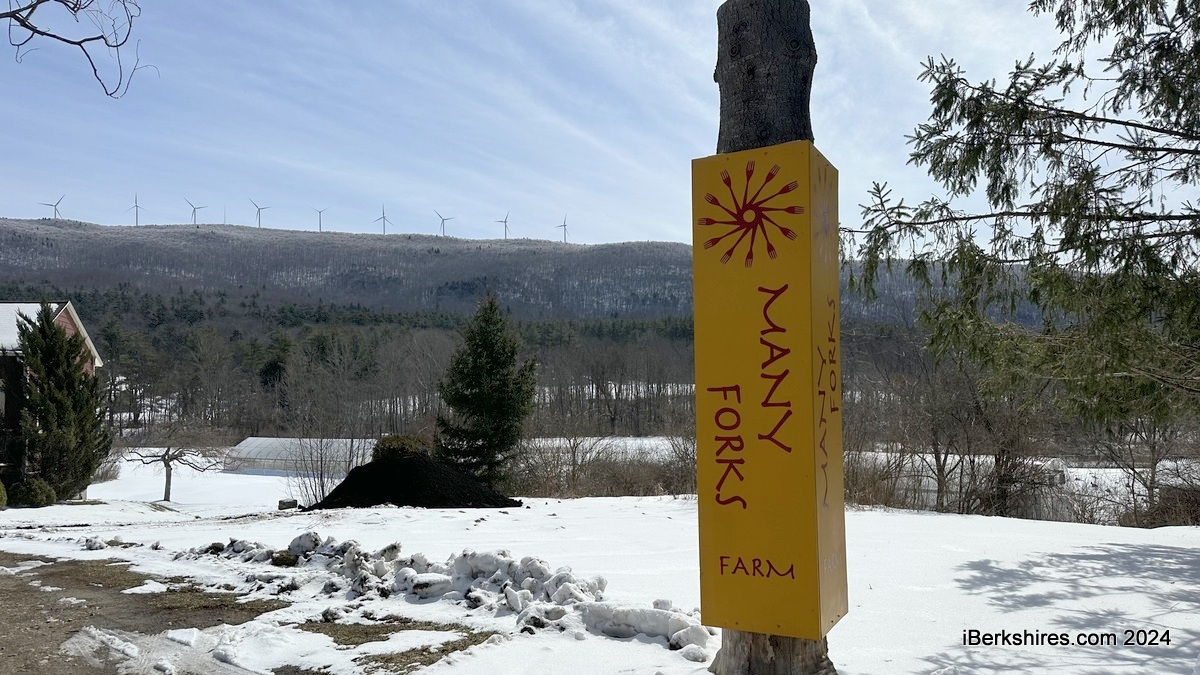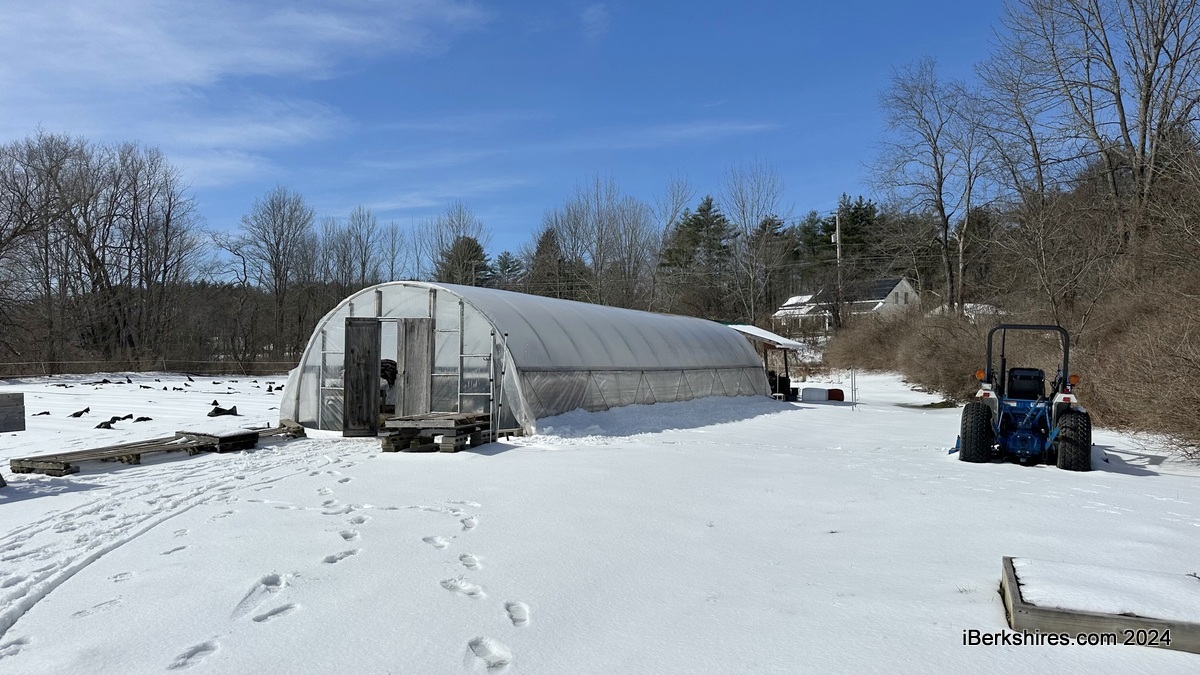BNRC Ensures Many Forks Farm Will Continue Under New FarmerBy Kim McMann, iBerkshires correspondent
05:32AM / Monday, April 08, 2024 | |
 Many Forks Farm in Clarksburg will have its future preserved as agricultural land. Many Forks Farm in Clarksburg will have its future preserved as agricultural land. |
.jpg)
Many Forks Farm has a new farmer, Molly Comstock, already at work planting seeds.
CLARKSBURG, Mass. — Molly Comstock and Sharon Wyrrick have traveled in the same circle for years, both farming at opposite ends of Berkshire County.
Around the time Wyrrick was looking for a successor after more than a decade at her farm in Clarksburg, Comstock's lease in Alford was suddenly not renewed.
The future of Many Forks Farm and Colfax Farm hung in limbo.
It took some time but, ultimately, with the help of the Berkshire Natural Resource Council, Wyrrick and Comstock were able to work out a plan for Many Forks Farm to continue under Comstock's ownership.
Their stories are not unique; across the nation older farmers are aging out while many younger farmers struggle to access land they can farm on. It's a complicated situation and finances impact what options exist.
"A generation of farmers are aging out of their profession," said Mackenzie Greer, director of public programs at BNRC. "Younger farmers struggle to secure farmland at reasonable prices, as the cost of Massachusetts farmland is rising as quickly as any in the country."
Making the best options affordable for retiring farmers and newer farmers can require resources, assistance from professionals, time and a bit of matchmaking.
Initially, Comstock worked with the Berkshire Land Trust, hoping to follow a model used by Indian Line Farm in Great Barrington to create a community land trust where Colfax Farm could relocate.
At the same time, Wyrrick was working with the Berkshire Natural Resources Council to ensure the land of Many Forks Farm would be conserved as farmland, preferably as a working farm.
"I knew she was looking for somebody but North County felt like it was practically Vermont, which it is is," said Comstock. (The border is a couple hundred yards down the road.) "But I came up here and I saw this an amazing farm, I realized how much Sharon had sacrificed, how she had bought a second parcel of land to make the farm whole."
That was 18 months ago.
Over the following months, Comstock started working at Many Forks Farm two days a week for the 2023 season, and they went over ways they could envision the future.
"Initially, I wasn't thinking long term at all, because I was leasing on the site. I guess I thought it would become clearer to me what the long-term picture would be as I went," Wyrrick said. "It was pretty quickly that I started to feel the limits of my situation because I was leasing."
Not having access to running water or electricity and not having a place to store produce after harvest were the most pressing needs.
While there are a number of avenues she could explore, "funding and grant opportunities are limited if you are not the land owner or don't have a long term lease," Wyrrick explained.
Wyrrick purchased the parcel that included a house and the two acres she had started the farm on, and then later was able to purchase another parcel to make the farm nearly 20 acres. The two properties had once been a single parcel and had been separated a couple of decades ago, so Wyrrick was putting it back together.
Having dealt with the roadblocks associated with short-term leasing, Wyrrick understood the importance of a long-term lease or land ownership for any successor.
Rich Montone, director of development at BNRC, said the plan ultimately agreed upon was that BNRC would purchaes the farm from Wyrrick at a generously low price and place legal conservation instruments on the farm that will remain with the deed in perpetuity.
Comstock will lease for two to three years and then purchase the farm, with the conservation restrictions, keeping not just the land conserved but the farm business intact as well.
The value of land under conservation restrictions is lower than land that can be developed for other uses, so BNRC pays more when purchasing the land than when it sells to the new farmer.
Montone explained, "BNRC can take that hit because it has donor support. Donors understand they are making a gift to the Berkshires so that Berkshire farming can continue."
BNRC reviews many factors when considering a conservation project. They are mapped into a tool used to score each property, considering, for example, carbon storage, clean water, wildlife habitat, food security, and adjacency to other conserved properties.
"We think about the scale of the project and if we are the right partner for it. Sometimes we might connect a land owner to a local land trust, such as one that's run by a town. We might connect them to a state agency or statewide entity like Trustees of the Reservation, if we think the project scale is better suited to them," said Montone.
"Farms this size can really contribute to a community and a farm this size make sense in this community," said Wyrrick.
Affordable housing for farmers and farm workers can often be scarce but the Many Forks property has a house as well. Workers from two nearby farms are living there now and helping out at Many Forks, too. This is another strength of the project.
Another factor is what the retiring farmer needs. If all of their family assets are tied up in a farm, their bottom-line price for selling will be higher. Market price for the property will be much higher if they just sell it with no restrictions. What the current owner wants will have great impact on whether a conservation project can happen.
"Early on, I knew that succession would become an important thing to begin to understand. I was a little bit aware … right after I moved to the Berkshires, Caretaker Farm [in Williamstown] started their process. I wasn't part of the process but I knew how long it would take and it was a good lesson for understanding how it would work," explained Wyrrick. "I had my first real thought in 2018 and 2019 when I had a consult with Land for Good to talk about options."
Montone said Wyrrick was generous in offering the farm at a bargain sale.
"If she had gone to market and sold the property to someone who wanted to be a gentleman farmer or just a beautiful property in the Berkshires, she could have gotten a lot more," he said. But she did a bargain sale to BNRC because she was conservation-minded and that was generous of her."
Comstock added, "Sharon worked so hard. We need more people like her, who are generous and thinking about land affordability and access, the shift in wealth and land ownership and that connection to farmers and especially to young people having access to land to grow food so people can eat."
It's the most important things we need as human beings, we need to eat and we need to have shelter, she continued. "I greatly admire her that she went through all of this incredible effort to make this farm affordable for another farmer without much benefit to herself.
"We need a hundred more people to do that in this county alone!"
"I'm grateful for Sharon's stewardship and generosity, for Molly's resolve and vision, and for all the donors who make agriculture in the Berkshires possible," said
BNRC President Jenny Hansell said she was grateful for Wyrrick's stewardship and generosity.

On a snowy March day, there was already much preparation going on at the farm.
"BNRC is proud to play a unique role among an impressive and inspiring cast of farm-forward organizations that are working in the Berkshires to protect and promote the farming traditions of this special, beautiful region of the world," she said.
Montone said BNRC is developing strategies to help young farmers secure long-term access to agricultural land in a way that will enable them to make capital investments.
"We have a number of talented farmers who can take over a farm with decades and decades of runway ahead of them in terms of managing that farm and making it a successful business that benefits the local community," he said. "Because the cost of farmland is sky rocketing nationwide and particularly in Massachusetts, it's difficult for a lot of farmers to put down the capital to get secure access to that farmland in an ownership kind of way. ...
"We are also helping farms continue in general because people are looking for is a way to pass farms on to the next generation."
BNRC has long conserved farm land in terms of putting protections on the land. Montone said the organization has recognized in recent years that it can play a big role in helping farmers.
"That's what we are trying to do here," he said.
Now that Comstock is in place at Many Forks Farm, Wyrrick said, "you're happy because you supported something good happening but then you're sad because it's leaving your life."
As for plans for the future, she said, "one likes to be useful and involved. I'm not good at doing nothing."
| 
 MEMBER SIGN IN
MEMBER SIGN IN
 MEMBER SIGN IN
MEMBER SIGN IN